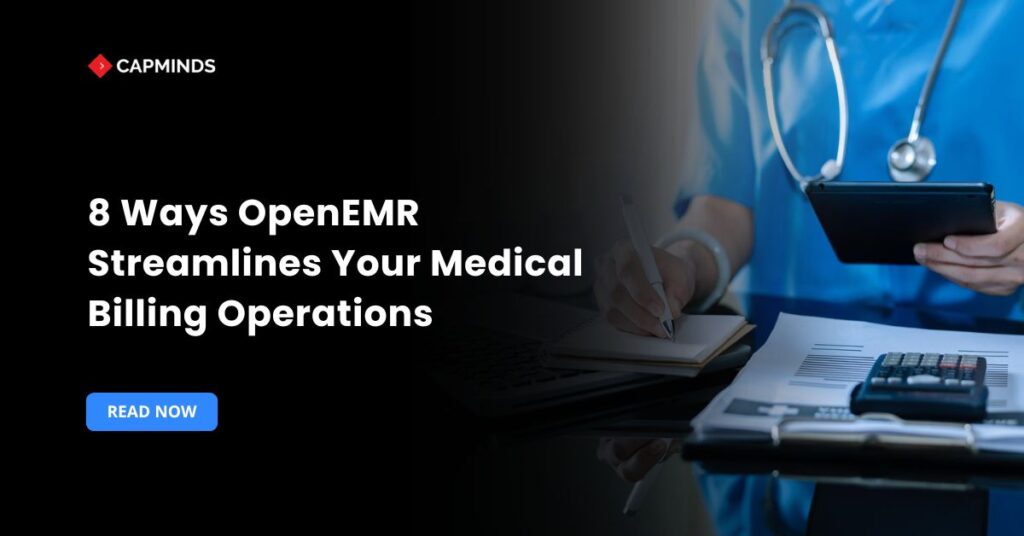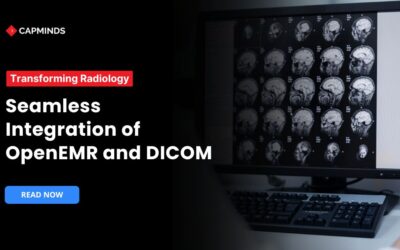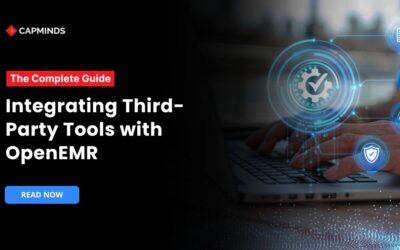8 Ways OpenEMR Streamlines Your Medical Billing Operations
OpenEMR is an open-source electronic record software. OpenEMR has more than 200 million patients from across the world and manages over 100,000 medical providers. The OpenEMR module contains various features like patient demographics, appointments, prescriptions, billing, and lab integration. In this blog post, you’ll explore the benefits and ways OpenEMR simplifies the medical billing operation.
What is OpenEMR and Medical Billing
OpenEMR is a free, open-source electronic health record system with a medical billing module. This involves features like billing process automation, accuracy, and optimization of organizational financial performance.
Medical billing is the process of generating claims for patients and submitting them to insurance providers for reimbursement of medical services. Claim submissions and insurance follow-ups can be complex and require accurate data to prevent errors.
OpenEMR’s Billing Module enhances the medical billing process, ensures better patient care, and ensures a seamless financial process for healthcare providers.
Benefits of Medical Billing in OpenEMR
1. Interoperability
Providers rely on interoperability for the exchange of patient data. OpenEMR provides FHIR integration for quick resource transfer. It helps in the secure sharing of information with other providers.
Hospitals can integrate third-party applications for specific healthcare. It improves the overall care coordination for the patients.
2. Claim Submission
OpenEMR streamlines claim submission by automating the claim process, reducing manual errors, improving operational efficiency, and making the billing process simple.
3. Patient Eligibility Verification
OpenEMR’s billing module allows for real-time insurance eligibility verification. It ensures that claims submitted are correct and minimizes claim denials.
4. Integrated Clearinghouse
OpenEMR supports electronic billing, clearing houses such as Office Ally, ClaimRev, Availity, and ZirMED help in secure transactions. Multiple payment options are available according to patient preference, and bills are generated.
5. Security Compliance
Patient data is a sensitive thing for healthcare organizations, and it requires high security. OpenEMR is a HIPAA-compliant software and follows other data standards.
Security measures like data encryption and MFA protect patient data from unauthorized users and cyberattacks. Regular software updates prevent vulnerabilities and data breaches.
OpenEMR Streamlines Your Medical Billing Operations
1. Patient Registration
In this process, the staff collects and verifies patient demographic information, insurance information, and medical history. It includes the basic information of the patient, such as name, address, gender, age, insurance details, and any medical conditions. Accurate data is important for ensuring medical billing.
2. Charge Capture for Diagnosis and Procedures
Charge capture is a critical step that involves documenting patients’ services, like diagnosis and treatment codes. It processes the services provided and the charges associated. After patient discharge, the reports are transferred to procedure codes, including the validation of bills and services provided.
3. Claim submission
Reports are submitted to the payer for reimbursement, which requires supporting documents such as medical codes and charge information. Claim submission must be accurate and completed.
Related: OpenEMR Billing Module: How to Simplify Claims Processing and Reduce Denials
4. Insurance Verification
Confirmation of the patient’s coverage and insurance benefits entails coverage within the insurance policy, deductibles, co-payments, and out-of-pocket limits. The financial needs of patients have to be brought to their attention.
5. Prior Authorization
Providers need to get authorization and precertification from insurance companies for certain medical services. It is important to obtain permission to make sure that the procedures or services are necessary for your care.
6. Payment Processing
The payments process includes monitoring payor adjudication, which is the insurance company’s cross-check of the patient’s coverage, services offered, treatments provided, and whether the claim is valid or not. After verification, the claims are approved, and payments are transferred to healthcare organizations.
7. Claim Denial Management
If a claim is denied, the reason must be identified, and resubmission must proceed. It includes figuring out the reason, preparing, and submitting an appeal to the insurance company.
Claim rejection affects the organization’s revenue cycle management. Denial management reduces the risk of lost revenue and provides full reimbursement to the healthcare providers.
8. Ensuring Compliance
Medical practices must ensure that the billing setup follows security compliance and other regulations. It includes HIPAA, GDPR, and data protection laws. This ensures that patient information is secure and safe by reducing the risk of penalties and data breaches.
Related: 10 Ways OpenEMR Billing Tools Help to Streamline Healthcare Practice Cash Flow
CapMinds OpenEMR Customization and Integration Service
CapMinds OpenEMR equips clinicians with the best features and ways to integrate. It makes their workflows more efficient and filtered.
The integrated features will allow them to combine the ability of patient record management with conceptual and concurrent reminders.
This enhances the process of decision-making and improves patient care and quality.
- At CapMinds, OpenEMR custom solutions are developed with much care and accuracy to match the special practice needs.
- It will be low-cost and the perfect budget solution for your practice’s long-term future.
- CapMinds OpenEMR prioritizes secure data management & ensures compliance with industry regulations, offering healthcare providers peace of mind.
Get the best technologies and HIPAA-compliant and efficient OpenEMR from CapMinds that can be tailored to fit your practice.
Our OpenEMR services facilitate a Modern User Interface (UI), customization, production support & training. It also facilitates billing, reporting, specialty enhancements, clearing house integrations, e-prescribing, cloud, and more.
“Get the most experienced, proven, and perfect professional support for your OpenEMR.”




